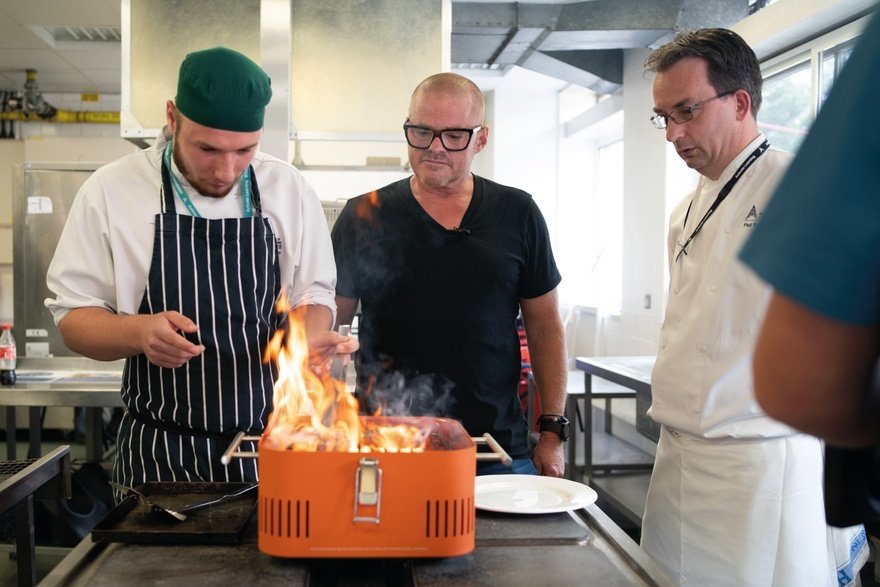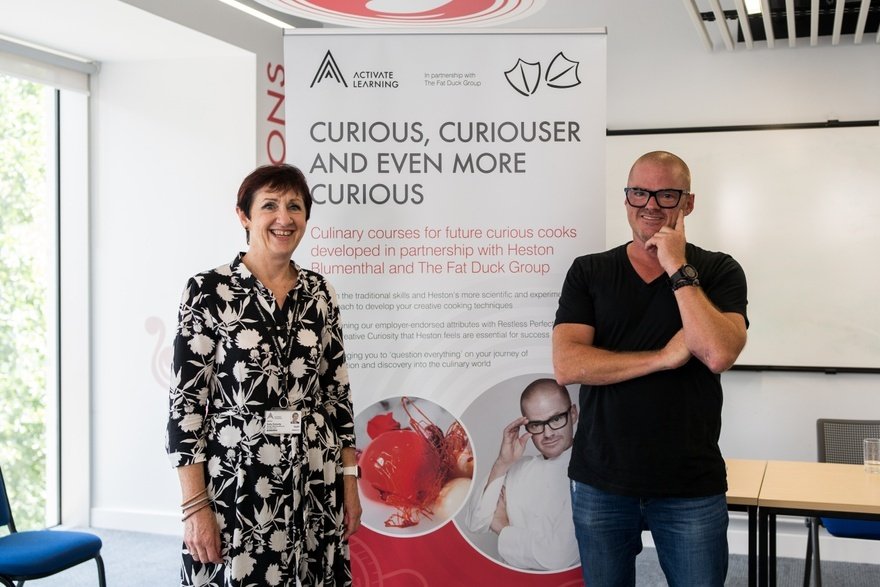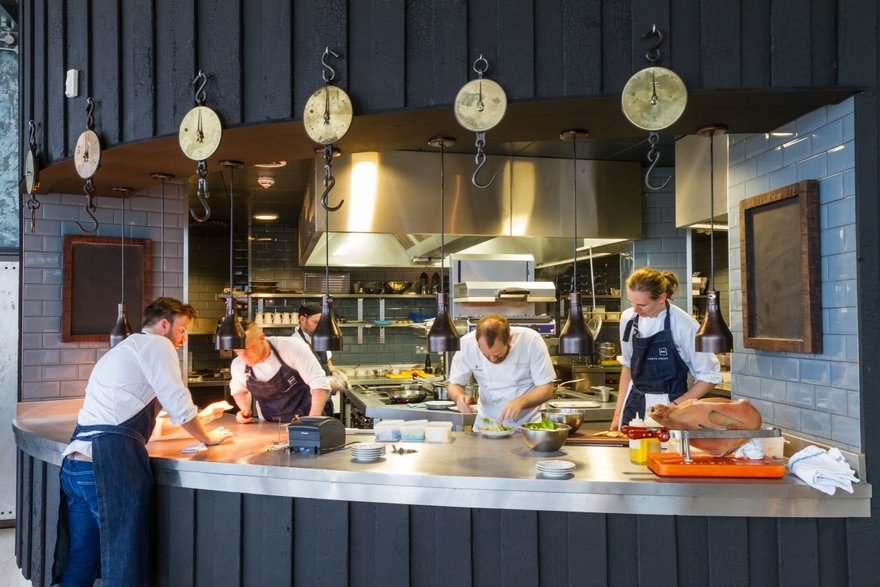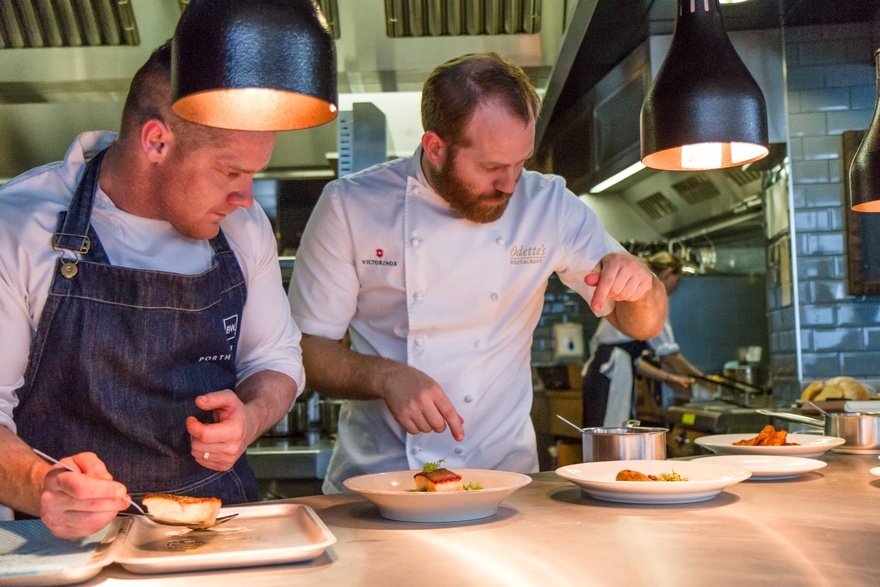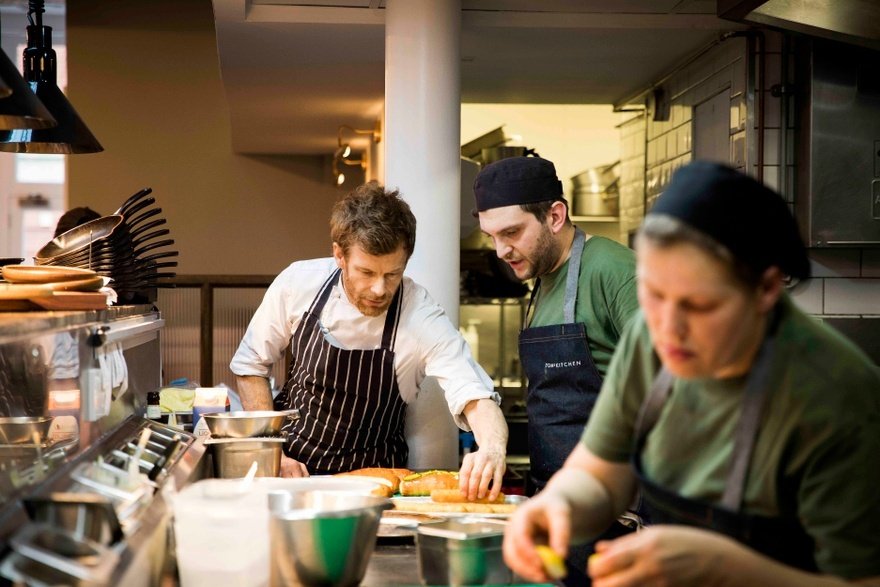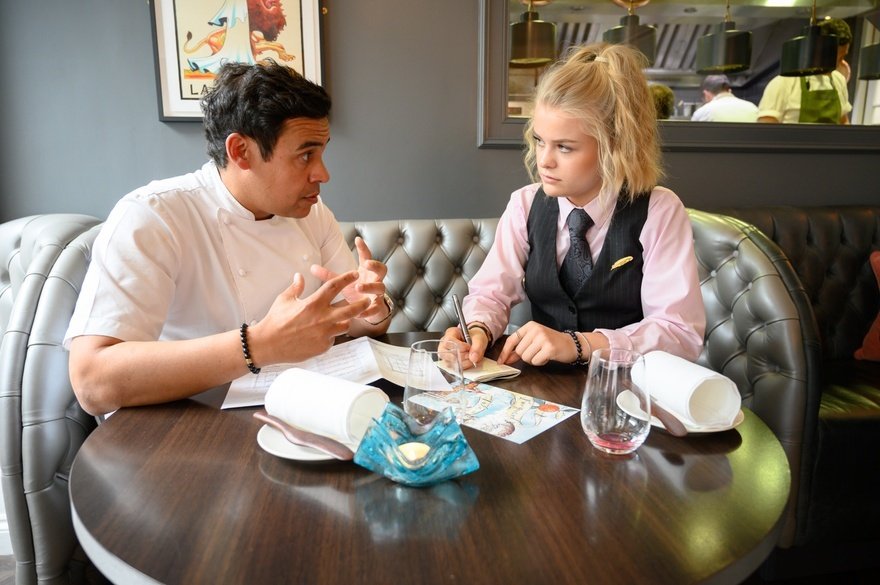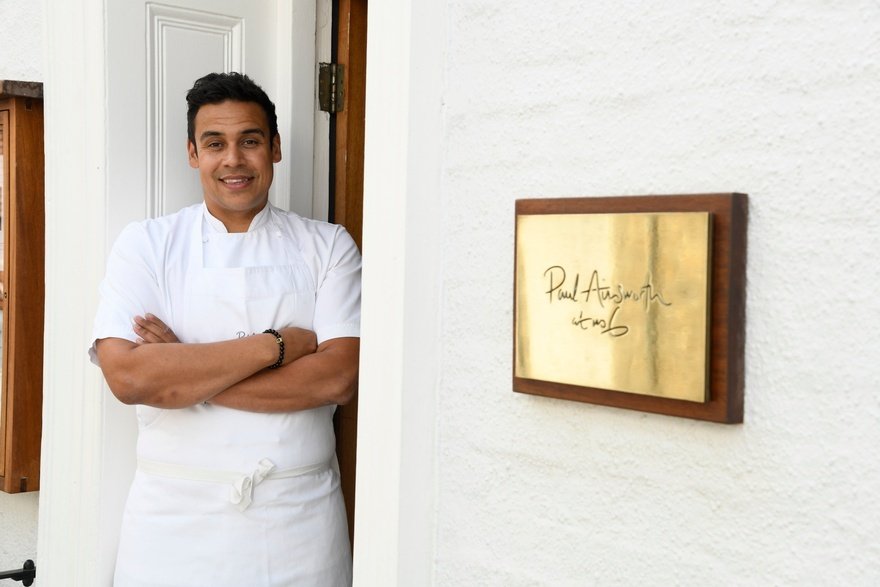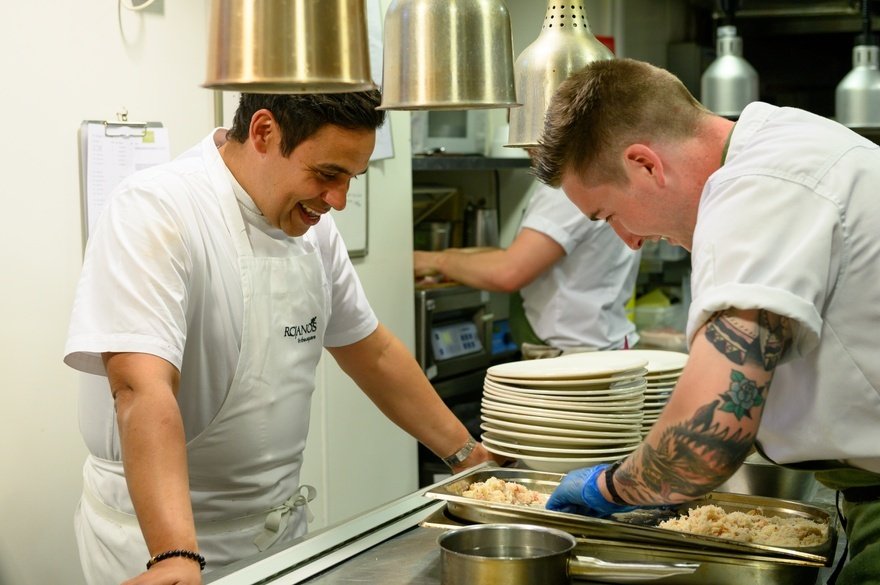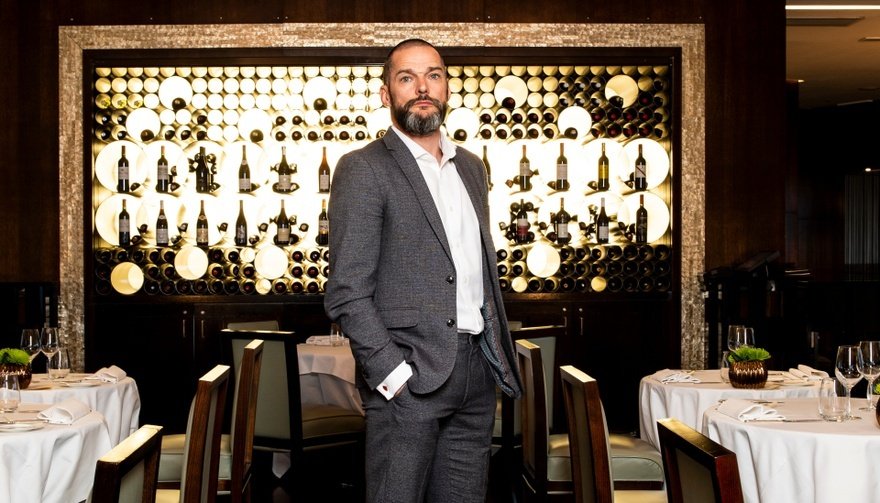With college restaurants falling victim to the guillotine of government cuts and businesses struggling to find the next generation of staff, Vincent Wood and Katherine Price take a look at hospitality education and ask operators, colleges and students how they are working together to keep the system alive
In City of Oxford College, a group of students are watching Heston Blumenthal cook a burger. The chef turned lecturer for the day arrived at the Activate Learning campus to launch a new course in conjunction with three-Michelin-starred the Fat Duck in Bray, Berkshire – the latest in a string of chef-college partnerships.
As he flips the meat every 20 seconds, he talks through the philosophy and science of his actions to a cohort of 16- to 18-year-olds, all working towards level two and three vocational qualifications. However, while one of the greatest chefs in the world is putting his clout behind the college, others are looking to the door.
"I'm going to Balliol [at the University of Oxford] for an apprenticeship," one says. "Here you do front of house and cooking, but if I go there, I can just do more cooking – I know the people there and it's a good working environment."
The balance between traditional catering colleges and apprenticeships is part of a vibrant ecosystem of qualifications that have long fed into the hospitality workforce in the UK. However after battling industry perceptions (see panel) and damaging policies, both are showing signs of strain.
The figures
On a national scale, the government is looking to champion apprenticeships; however, the number of workplace learning positions taken up over 2017 shows a steep decline, with some 375,800 signing up across all industries, down 26% on the previous year, according to the Office for National Statistics.
On the flipside, college services have suffered from diminished funding, affecting their ability to cover the costs of training kitchens, public restaurants and catering courses. Overall funding in further education (FE) colleges, where many receive level two and three qualifications in vocational subjects including NVQs and BTECs, has dropped by 8% from 2010 to 2017, according to an Institute for Fiscal Studies report. Staffing has also been hit – the number of teaching posts fell by 23,000 across the period, a third of the former workforce.
While falling apprenticeship figures can be more easily revived with a tweak in policy, FE colleges and their kitchens require a continuous flow of new students to survive. In March, Accrington and Rossendale College in Lancashire was one of a string of colleges to discontinue courses due to lack of interest in its in-house offering, with principal Amanda Melton saying at the time: "Student recruitment in the hospitality and catering department has seen a downward trend over the past few years, not only at ARC, but nationally as well. More students are opting for work-based provision instead of full-time programmes, and, as such, our apprenticeship catering provision will remain the same."
Andy Woods, deputy director hospitality and catering at Coleg Cambria, which has multiple campuses across north-east Wales, believes both colleges and apprenticeships must continue to survive if young people and the industry are to be properly served. Far from curtailing their catering course investment, the college is looking to lean into troubled times and spend more – and is currently funding a new training restaurant alongside three new kitchens and a pâtisserie.
"Obviously there's a skills shortage and it's an area of growth," says Woods. "As educators, we need to try to support that, because we can see the industry struggling to recruit nationally. We're trying to do the best we can to attract people into the industry and meet that sector need – that's what vocational education is for: to help fill skills gaps.
"For some people, apprenticeships are perfect," he adds. "For others, they're just not ready to go into work yet. They need that year or two in college to help them develop. Both are very creditable, but I think they're both needed, because the difference that we have in the people coming into college is huge. If we only offered apprenticeships, I think that would disadvantage a lot of people."
"Some people need a little bit of a slower pace to learn, and some thrive in pressure," agrees Bryn Williams, chef-patron of eponymous restaurants in London's Somerset House and Porth Eirias, Colwyn Bay, as well as Odette's in London's Primrose Hill. He runs an academy in partnership with the college for NVQ level two students, who spend eight weeks a year working at his Porth Eirias restaurant, which he says offers the "best of both worlds".
He says the academy had to offer a point of difference which, for him, was students focusing on front of house or cooking – not both, as they would have studied at level one. "I knew I wanted to be a chef, so when the front of house bit came, I was in the pub, because it wasn't what I wanted to do," he remembers.
"If we're going to retain these people, if they start losing heart and not turning up to college, surely that's not a good thing? Let's adapt what we have to keep these individuals interested in our industry."
Breadth of learning
Williams' complaint is a common one – many young chefs of the future are looking to hone their craft and have little interest in learning about the world of front of house. However, Woods argues, the service provided by training in customer-facing roles is an important one in developing soft skills.
"By getting them into that front of house situation, their customer skills are improved, their confidence is improved. We're not just here to teach them the core skills of hospitality, we're here to teach them resilience and we're here to teach them how to function in the working world. That's something we really get them to focus on – these soft skills – because that's something I don't feel they develop enough in school."
The breadth of learning available to college students plays into another strength trickier to replicate in the world of on-the-job training – while working chefs can learn to adapt to service and be paid for the privilege, the experience gained offers a limited view of the wide world of hospitality. Oliver O'Tool, a 19-year-old student at City of Oxford College, joined the course after working in the industry for four years. He is now set to join Exclusive Collection's Manor House hotel and golf club in Castle Combe, Wiltshire, home to the Michelin-starred Bybrook restaurant.
"I worked in a nice restaurant with a good chef, but you can only learn so much because of the menu we were doing," he tells The Caterer. "Coming to college allows me to focus my skills and practice new things, try different cuisines and work with different ingredients that I wouldn't otherwise get to work with, so it does open your horizons. It gives you that broader range of skills and knowledge, as opposed to being in an Italian restaurant and doing Italian cuisine, or being in a French restaurant and doing French cuisine. OK, you might learn butchery and fish, but you do that at college anyway, so it is good to learn a whole range so you can then choose the path you're going to go down."
One of the invaluable features of his course has been the public-facing restaurant, allowing him to hone his service skills while improving his cuisine. "You learn your sauces, you learn your knife skills," O'Tool says, "but also you're not so pressured, because you're not in that work environment. You don't have to do all the prep and if you mess up, you can have someone to see where you've gone wrong and what you can do to build upon that. It's about the learning, whereas in that pressured work environment, you know it has to be right."
Paul Buckey, a lecturer at City of Oxford College with 10 years' experience, says that freedom to make mistakes is vital. "Because the students are in a safe environment, they can make mistakes. You learn more by making mistakes, and because they're in college in some of our lessons they can do that and they don't have to be ashamed of it."
Big names, important lessons
But such kitchens are under threat, even in the upper echelons of training kitchens. The closure of the AA's first College Restaurant of the Year, Foxholes at Runshaw College in June, caused an outcry from top chefs, including alumnus Mark Birchall. Tom Aikens (pictured above, left) also expressed serious concerns over the closure and emphasised the importance of hospitality students gaining experience in a realistic working environment.
"The curriculum is an important factor in them being excited and motivated into wanting to be in the industry," says Aikens. "If you haven't got a course that works for them and it's purely sitting at a desk, then it's not going to help anyone… It has to be balanced in terms of practical and theory."
Another chef to throw his support behind local education is Paul Ainsworth, who took matters into his own hands last year and, in partnership with Truro and Penwith College, launched the Paul Ainsworth Academy, which has so far taken on four apprentices across his six Cornwall-based businesses.
The students spend four days working and one day at college, which Ainsworth, winner of both the Restaurateur of the Year – Independent and Chef Award at the 2019 Cateys, says ensures their training is "totally up to date and relevant with the industry right at the cutting edge", as well as curriculum-compliant.
"It's showing young people that it is hard work and we do work unsociable hours, but the rewards are fantastic if you just really stick at it. Like anything in life, you get out what you put in and hard work can pay off," says Ainsworth, who trained at Southampton City College.
"I am so glad I went to college full-time," he says. "I was late for college by 15-20 minutes every single day and there was a college lecturer who'd say, ‘the problem with you, Ainsworth, is you want to get your arse out of bed earlier'. Little did he know, every single morning I was working breakfast at the Star hotel from half past five. Breakfast finished and college started at nine o'clock. I'd sprint to college, and then I was back for dinner service. I was doing college almost with an apprenticeship on the side."
Meanwhile, Williams' academy is already bearing fruit – one student is set to join his Porth Eirias restaurant full-time in September. He says it's important to support students after their courses, and is committed to offering employment where he can, putting on lunches for the academy students and alumni, and using his contacts book to help them find experience elsewhere.
"We're hoping we can retain people, keep them interested in what we do and leave the academy and college with enthusiasm to go into front of house or the kitchen," he says.
Ainsworth adds: "As restaurant operators, we need to work with colleges more closely than ever, because if we don't, this problem we have with trying to get people into our industry is going to get worse and worse."
Early engagement
"We need to tackle the issue of education, we need to fund professional education, we need to have school restaurants, but we need to go into schools and teach kids about restaurants and the hospitality industry," says Fred Sirieix, general manager of Galvin at Windows in London.
Sirieix is practising what he preaches – not only does he go into schools himself, but hopes to reach schools on a national level with his new CBBC television show Step Up To The Plate, where he and Allegra McEvedy put teams of 10- to 14-year-olds in charge of a restaurant to inspire the next generation.
It is a view shared by educators. Andy Woods of Coleg Cambria says: "I think vocational education is almost seen as a second choice by parents – they'd rather see their child do their A levels and then go on to university. I'm not sure careers advice in schools is good enough, and I'm not sure they talk about careers in hospitality as a viable option."
Continue reading
You need to be a premium member to view this. Subscribe from just 99p per week.
Already subscribed? Log In


